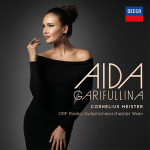|
Back
03/26/2017
“Aida Garifullina”
Charles Gounod: Roméo et Juliette: “Ah! Je veux vivre”
Léo Delibes: Lakmé: “Bell Song”
Nikolai Rimsky-Korsakov: Sadko: “Song of India” (arr. P. Bateman) – The Snow Maiden: “The Snow Maiden’s Aria” – The Golden Cockerel: “Hymn to the Sun” – “The Queen of Shemakha’s Seduction Aria” – “Oriental Romance” from The Rose and the Nightingale, opus 2, n° 2
Pyotr Ilyich Tchaikovsky: Six Romances, opus 63: n° 6 “Serenada” (arr. C. Hazell) – Mazeppa: “Maria’s Lullaby”
Sergei Rachmaninoff: Twelve Songs, opus 21: n° 5 “Lilacs” (arr. M. Rot) & n° 7 “How Beautiful it is Here” – Fourteen Songs, opus 34: n° 14 “Vocalise”
Traditional: ”Allüki” (arr. P. Campbell) – “Cossack Lullaby” (arr. T. Kim)
Vasily Solovyov-Sedoy: Midnight in Moscow
Aida Garifullina (Soprano), ORF Radio Symphony Orchestra Vienna, Cornelius Meister (Conductor), Osipov State Russian Orchestra, Vitaly Gnutov (Conductor)
Recording: ORF Grosser Sendesaal, Vienna, Austria and Bolshoi Hall, Tchaikovsky Conservatory, Moscow (February 24-25, March 17-19, 2015; May 20-21, 2016 and June 13 & 16, 1962) – 58’53
Decca # 478 8305 – Booklet in English, French and German (Distributed by Verve Label Group)

   
It’s not surprising to find Aida Garifullina’s road paving way to something grand. Her mother, a choral conductor, quickly discovered an extraordinary voice hidden within and was discerning enough to begin lessons for her daughter early on. At age 17 Aida Garifullina left home to begin studies in Nuremberg under Siegfried Jerusalem with subsequent training by Claudia Visca in Vienna. But it wasn’t until 2013 when the gifted singer caught Plácido Domingo’s attention during the Verona Operalia competition. Since then, Aida Garifullina has become quite the attention-getter and is now one of the most sought after sopranos.
This debut album weighs heavily on selections gathered from her native Russia with introductory 19th century French opera coloratura samplings. The two opening arias excerpted from Roméo et Juliette and Lakmé display the livelier, flashier side of Ms. Garifullina’s timbre: “Ah! Je veux vivre” generates ample excitability though the pace rushes with a tad too much anxiousness while loftier notes are noticeably hastened. Desiring to sing Lakmé’s particularly difficult aria required a key transposition to accommodate her lower tessitura. Despite commendable efforts and attempts to bring depth to the rendition, the choice muddies Delibes’ intended effect of pizzicati-like pinging in the upper register in contrast to stronger cases surrounding coloraturas Mady Mesplé and Mado Robin.
Where Aida Garifullina arrestingly touches the ear is settled within the remaining works, all which originate inside her Motherland: she’s in her element, collectivizing many types of emotional stretches to make the librettos pop with meaning and empathy. Native reminisces are visceral and well-articulated particularly in the traditional lullaby, “Allüki” and Rachmaninoff’s “Lilacs.”
Aida Garifullina’s voice simply floats like a wave of liquid velvet. Rimsky-Korsakov’s “Hymn to the Sun” has radiance and flourished notoriety, while the feeling of temptation surfaces beautifully in the “Seduction Aria” from The Golden Cockerel. One the most pleasing attributes Ms. Garifullina brings to the forefront is her polished grace notes, particularly evident in the “Oriental Romance” and folk music from the Tatar countryside. She dissipates notions of effort surrounding any one of the many difficult reaches found on this album. It makes the listen that much more imposing and persuasive.
Alignment of notes to voice is convincingly impeccable with a delivery being erudite, direct and confident without assumed swagger. This Decca CD is pure joy.
Christie Grimstad
|